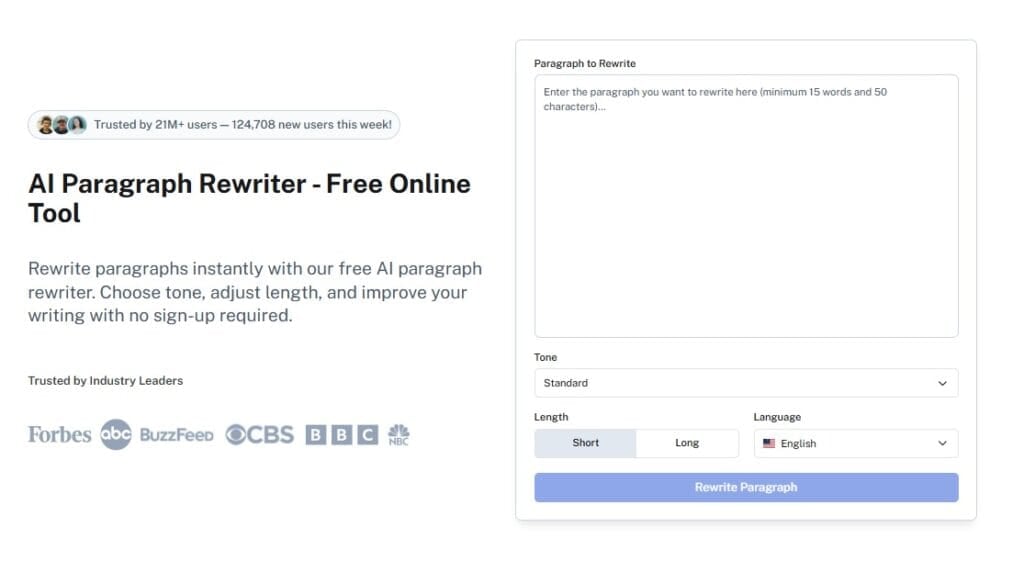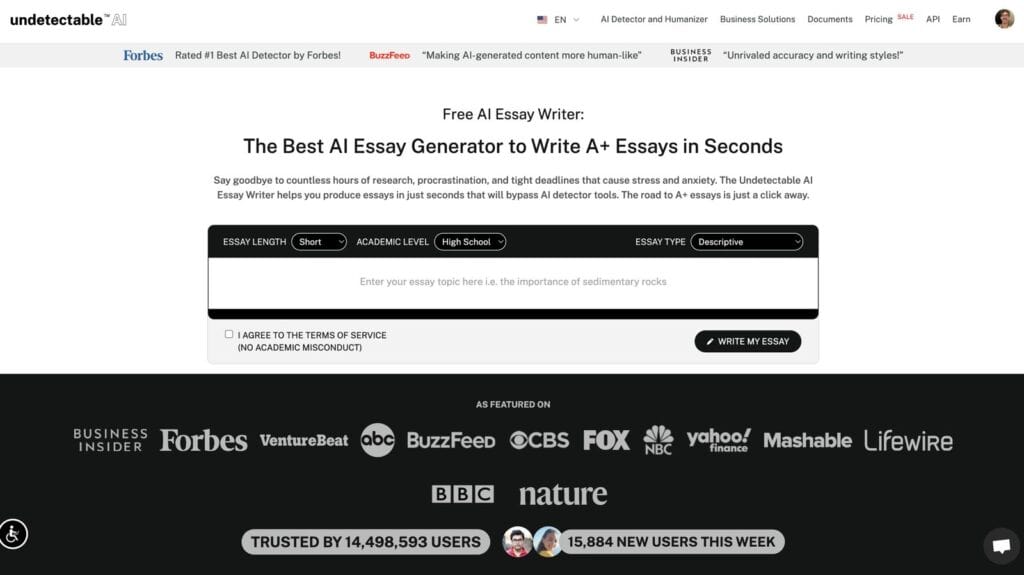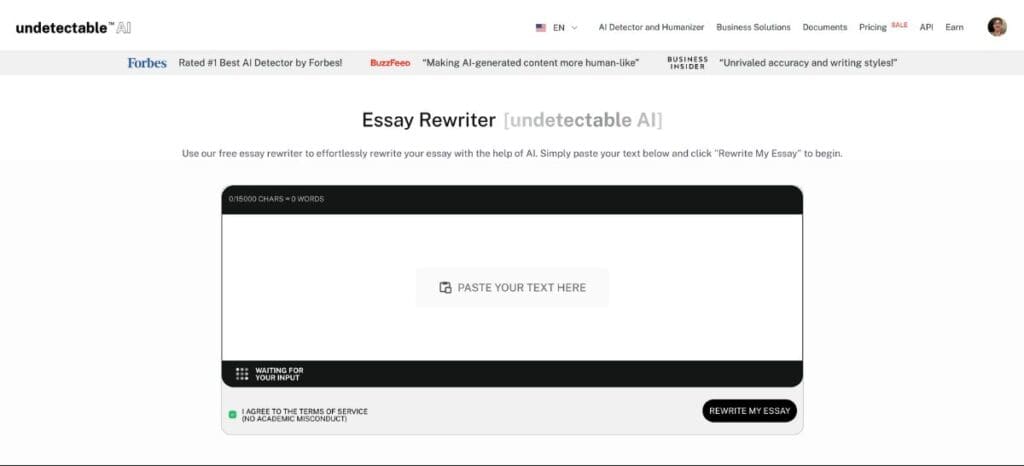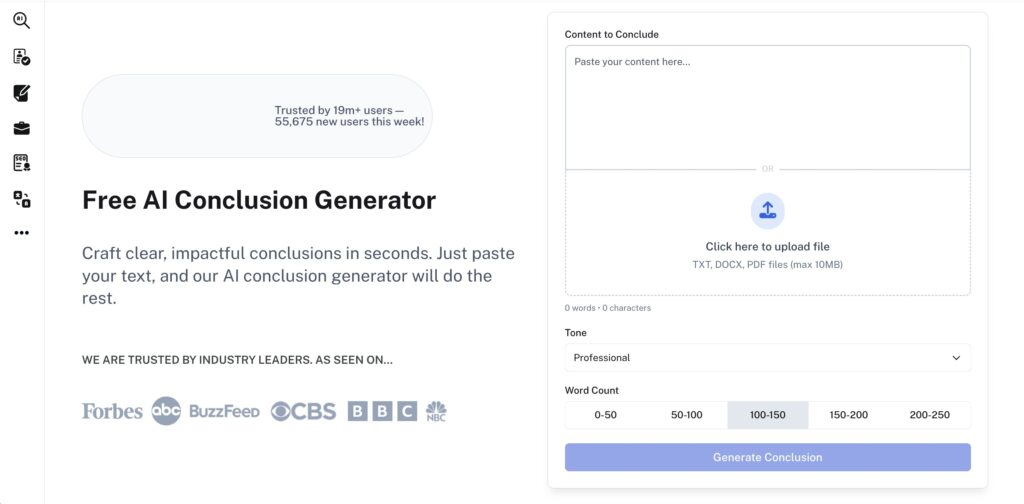During school, most of us learned that there are four main types of essays in academia or professional settings.
These typically include the expository essay, the descriptive essay, the narrative essay, and the argumentative essay.
But did you know that there are many more nuances to essay types?
Beyond these basics, there are actually many other essay formats used in various contexts.
In this guide, you’ll discover a lot more—16 more, to be exact—that will open up new perspectives on essay writing and provide you with a foundation for tackling different writing tasks.
What Are Essays?
Essays are your intellectual playground.
They’re where ideas take shape, arguments come alive, and stories find their voice.
Think of essays as conversations on paper—structured discussions that help you explore, explain, or argue your point of view.


Never Worry About AI Detecting Your Texts Again. Undetectable AI Can Help You:
- Make your AI assisted writing appear human-like.
- Bypass all major AI detection tools with just one click.
- Use AI safely and confidently in school and work.
But essays aren’t just academic or professional exercises.
They’re essential tools for critical thinking, communication, and personal growth.
According to GSU, one of the primary aims of undergraduate education is to develop citizens who can engage in problem-solving and write clearly.
Whether you’re applying to college, writing for work, or sharing your thoughts online, knowing different essay types gives you the right tools for the job.
What Are the Different Types of Essays?
Like choosing the right knife in a kitchen, picking the correct essay type makes all the difference.
Let’s explore each type, starting with the most common ones you’ll encounter.
Table of Contents
1. Narrative Essays: Telling a Story

Remember that time you couldn’t stop telling your friends about an amazing experience?
That’s essentially a narrative essay. It’s storytelling with purpose.
A great narrative essay weaves personal experiences into a compelling story with a clear beginning, middle, and end.
The secret lies in using vivid details that engage the senses while leading readers toward a meaningful conclusion or lesson learned.
Consider this example topic: “How Getting Lost in Paris Changed My Life.”
2. Descriptive Essays: Painting a Picture with Words
Close your eyes and imagine your grandmother’s kitchen.
The warm smell of cookies, the flour-dusted countertops, the gentle hum of the old refrigerator.
That’s descriptive writing at its finest.
Success in descriptive writing comes from immersing your reader in the moment through sensory details.
Using concrete and sensory-packed language allows readers to vividly experience the scene you’re describing.
Focus on specific observations rather than general statements, and choose words that create both visual imagery and emotional connections. If you’re incorporating visuals in your essay, tools like AI Image Detector can help verify their authenticity, ensuring credibility and originality in your work.
3. Expository Essays: Explaining Concepts and Ideas
Your task here? Making complex ideas crystal clear.
Expository essays break down topics into digestible pieces.
The key to success lies in maintaining an objective tone while presenting information logically.
Start with a clear thesis statement, then build your explanation through well-organized evidence and examples.
Remember: you’re explaining, not arguing, so keep personal opinions out of it.
4. Persuasive Essays: Convincing the Reader

Now, we’re entering the realm of influence.
Writing a persuasive essay is your chance to change minds.
They’re essentially like courtroom arguments but on paper.
The most effective persuasive essays combine logical reasoning with emotional appeal.
Here are the essential ingredients for success:
- A strong opening statement that grabs attention.
- Compelling evidence from credible sources.
- Emotional appeals that resonate with readers.
- Clear call to action.
- Thoughtful handling of counter-arguments.
5. Argumentative Essays: Building a Strong Case
An argumentative essay is like the academic debate team meets research paper.
While similar to persuasive essays, argumentative essays lean heavily on formal evidence and logical reasoning.
Your success depends on extensive research, multiple credible sources, and carefully structured arguments.
The tone remains professional throughout, focusing on facts rather than emotional appeals.
Writers are expected to investigate a topic, gather credible evidence, and present their case with a finesse that would make even Aristotle nod in approval.
Done right, an argumentative essay will not only win debates but also leave no room for rebuttals.
6. Compare and Contrast Essays: Analyzing Similarities and Differences
These essays are like playing spot-the-difference with ideas.
You’ll explore how things are alike and different, leading to deeper insights.
Writers typically choose between two approaches: examining each subject separately or analyzing specific points across both subjects.
Take this example: “Netflix vs. Traditional Television: The Evolution of Entertainment.”
This topic allows you to explore how viewing habits, content creation, and business models have transformed over time.
7. Cause and Effect Essays: Exploring Relationships
What happens when? Why does it happen?
These essays connect the dots between events and outcomes.
When writing a cause-and-effect essay, you’ll have to position yourself as a detective, tracking how one event leads to another.
The key to success lies in establishing clear connections and supporting them with solid evidence.
Your writing should flow naturally from causes to effects, helping readers understand complex relationships.
8. Critical Analysis Essays: Evaluating and Interpreting

Time to put on your detective hat!
Critical analysis essays require deep investigation and thoughtful interpretation of works, ideas, or events.
Your role is to examine not just what something is but what it means.
Look beyond the surface to consider context, evidence, and implications.
The best critical analyses combine careful observation with insightful interpretation.
9. Reflective Essays: Personal Growth and Insights
Reflective essays should be like your own personal TED Talk—but on paper.
They’re like journal entries with a mission, diving deep into how experiences mold and shape us.
These essays are personal yet polished, offering structure to your story.
The magic lies in connecting those “aha” moments to life’s bigger picture—whether it’s about growth, lessons learned, or perspectives transformed.
Share your journey, but always land on what it taught you and how it left you wiser (and maybe a little kinder) than before.
10. Definition Essays: Explaining Terms and Concepts
These go far beyond dictionary definitions.
A good definition essay explores the full meaning and implications of terms or ideas.
Consider how the concept has evolved, how different people understand it, and what it means in various contexts.
For example, a definition essay on “success” might explore its meaning across cultures, generations, and personal perspectives.
11. Process Essays: Step-by-Step Instructions

Process essays mimic recipe books, but instead of teaching someone how to bake cookies, you’re teaching someone how to tackle life’s tricky tasks.
Whether it’s assembling your new cat furniture (good luck) or crafting the perfect apology text, the goal is to guide readers step by step with crystal-clear instructions.
The secret sauce?
Break it down like a pro:
- Serve up steps so simple even a distracted goldfish could follow.
- Sprinkle in warnings about common pitfalls (because “mixing” and “combining” aren’t the same—ask any baker).
- Add a dash of expert tips for Michelin-star results.
- And finally, serve it all with explanations so your readers know why each step isn’t just there for decoration.
Voilà—your process essay is ready to be served, fresh out of the oven and irresistibly effective.
12. Synthesis Essays: Combining Multiple Perspectives

Say you’re the host of an intellectual dinner party.
Different ideas from all corners of the room are mingling, debating, and collaborating to create something new.
That’s the essence of a synthesis essay—you’re not just the messenger reporting what others think but rather one that combines different views to offer new insights.
Success lies in spotting how different sources relate, finding the common threads, and weaving them into your own unique argument.
It’s about making connections that others might miss and, yes, making your essays longer by adding depth and nuance to your analysis.
Done right, a synthesis essay is less of a collage and more of a masterpiece—a conversation that leaves readers thinking long after the last word.
13. Problem-Solution Essays: Addressing Challenges with Solutions
These essays tackle real-world issues head-on.
They start by clearly defining the problem and its impact.
Then, they explore possible solutions, weighing their pros and cons.
The best problem-solution essays will propose ideas, and beyond that, will show why certain solutions would work better than others and how to implement them effectively.
14. Analytical Essays: Breaking Down Complex Ideas
In an analytical essay, you’ll need to break complex topics into bite-sized, digestible parts.
First, identify the main components—what are the key ideas, arguments, or concepts?
Then, ask yourself how these pieces interact.
Are they harmonious or clashing?
Finally, connect the dots and show why it all matters.
This essay is like a blueprint for understanding something that once felt overwhelming.
Keep it clear, keep it sharp, and keep your audience hooked.
15. Review Essays: Summarizing and Critiquing Works
Reviews go beyond simple thumbs-up or down ratings.
Good review essays provide thoughtful analysis backed by specific examples. Here:
- Introduction: Set the stage with the work you’re reviewing—what is it, who made it, and why does it matter?
- Body: Dive deep with thoughtful analysis. Highlight both the good stuff (stellar characters, killer plot twists, ingenious design) and the areas that need work (pacing issues, lackluster execution, or meh performances). Use examples like a pro reviewer would.
- Conclusion: Wrap up with your ultimate verdict—balanced, fair, and insightful. Your readers want you to give them the context and the tools they need to understand your perspective.
16. Exploratory Essays: Investigating Without Bias
The journey matters more than the destination in exploratory essays.
Exploratory essays thrive on questions, not answers.
Start by sharing your curiosity—what sparked your journey?
Then, take your readers along for the ride as you uncover new perspectives, encounter surprising viewpoints, and wrestle with unresolved tensions.
Keep the tone conversational, like you’re sharing your discoveries over coffee.
Don’t worry about perfect conclusions, as the goal is to celebrate the messy, fascinating process of learning.
17. Imaginative Essays: Creative and Fictional Writing

Let your creativity shine while maintaining essay structure.
Blend storytelling techniques with clear purpose and meaning.
The challenge lies in balancing creative expression with coherent organization.
Your imagination can soar, but your writing should still guide readers toward meaningful insights.
18. Personal Essays: Sharing Personal Experiences
Great personal essays feel like intimate conversations with a trusted friend.
Share your experiences honestly, but always connect them to universal themes that readers can relate to.
The most compelling personal essays reveal both individual stories and broader truths about human nature.
19. Application Essays: Showcasing Individual Strengths
Here’s where you highlight your unique value.
The most effective application essays focus on the following:
- Specific experiences that shaped you
- Concrete examples of your abilities
- Clear connections to future goals
- Authentic voice and personality
20. Rhetorical Analysis Essays: Examining Persuasion Techniques
These essays explore how others persuade.
Examine the strategies writers or speakers use to influence their audience.
Consider their word choice, argument structure, and use of emotional appeals.
Evaluate not just what they say but how they say it and why their methods work (or don’t).
When to Use Each Essay Type
Choosing the right essay type depends on your goal:
- Need to tell a story? Go narrative.
- Want to explain something? Choose expository.
- Making an argument? Pick argumentative.
- Applying somewhere? Use application.
Let your purpose guide your choice.
Think of essay types as tools in a toolbox—each designed for a specific job.
Before you begin writing, ask yourself: What’s my ultimate goal?
Matching the essay type to your purpose ensures you’re communicating with clarity, precision, and impact, like an academic pro with a touch of style.

If you find that your draft feels a bit “stiff” or doesn’t quite match the required style, you can use our Undetectable AI’s Paragraph Rewriter to help you adjust the tone and structure of your paragraphs to fit any of the 20 major essay types.
It’s an essential bridge for shifting your voice from the clinical tone of a critical analysis to the more conversational flow of a reflective essay.
How to Write Any Type of Essay Very Well
The internet is bursting with tutorials on essay writing.
These include how to craft introductions, nail those hooks, and structure arguments.
But let’s face it, sifting through all that advice can feel like a full-time job.
Undetectable AI can act as your ultimate essay sidekick.
With two brilliant tools—Essay Writer and Essay Rewriter—you can kiss essay stress goodbye.
Here’s how they work and how to make the most of them.
The Essay Writer tool is like having a personal essay guru at your fingertips.
It generates fully-structured, custom essays tailored to your specific topic and requirements.
Whether it’s a high school assignment, a college application essay, or a professional report, this tool crafts content that’s well-researched, logical, and spot-on for your needs.

- Simply type in your essay topic or question. For example, “The impact of renewable energy on the economy.”
- Choose the length and academic level (high school, uni, or doctorate) and the essay type (argumentative, expository, etc.).
- Hit the button, and voilà—your essay is ready, complete with a clear structure, strong arguments, and smooth transitions.

The Essay Rewriter can be thought of as your essay’s personal trainer, helping it reach peak performance.
This tool takes an existing draft and refines it—improving sentence flow, enhancing word choice, and ensuring your arguments are razor-sharp.
It’s perfect for turning decent essays into masterpieces.

Another tool that you can use is AI Conclusion Generator, once your main points are in place, this tool helps you create a thoughtful, well-structured conclusion tailored to your essay type—so your final paragraph doesn’t fall flat.
It analyzes your draft and crafts a closing that ties everything together with clarity and confidence, saving you from the dreaded “how do I end this?” moment.
You can also explore our AI Detector and AI Humanizer using the widget below!
Master Any Essay with Undetectable AI
Essays are powerful communication tools, but understanding the different types can help you better choose the right approach for your purpose.
Great essays start with clear thinking.
Choose your type wisely, plan carefully, and write confidently.
With practice and the right tools, you’ll master any essay type that comes your way.
Need help with your next essay?
Try Undetectable AI’s tools, designed to make your writing journey smoother and more successful.
